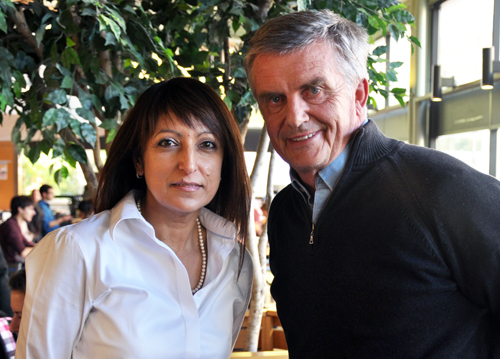
The University of Guelph is exploring ways to strengthen its long-standing ties with East Africa.
It’s looking to improve connections with academics, governments, industry, non-governmental organizations (NGOs), alumni and others in Guelph, East Africa and beyond.
The goal is to work together on such regional issues as food security and scarcity, water and resource problems, and poverty, says Kevin Hall, vice-president (research). Academic opportunities for students from both U of G and East Africa will also be contemplated.
“Small changes can make a big difference,” says Hall. “We want to use our research and training strengths to help find simple solutions that improve the quality of people’s daily lives. This aligns with Guelph’s strategic priorities for internationalism, humanitarianism and environmental sustainability, and with our multidisciplinary approach to research and learning.”
He has asked business professor Rumina Dhalla, College of Management and Economics, and professor emeritus Peter van Straaten, School of Environmental Sciences, to facilitate discussions here and in East Africa. Both are former Tanzanian residents.
“We want to extend our window to the world,” says van Straaten, who has conducted research in East Africa for 40 years. “It’s all about capacity-building. We have a lot of linkages there already, and president Summerlee is heavily involved in efforts in the region.”
He and Dhalla have recently visited various East African countries to meet leaders of universities, governments, NGOs and industries, and to strengthen U of G’s existing partnerships.
They want to hear from U of G faculty, staff and students during town hall meetings to be held Oct. 19, from 2 to 4 p.m., and Oct. 22, from 2 to 4 p.m. Both meetings will take place in the University Centre, Room 442.
“We need background on our own faculty – who is doing what over there, who can offer what, who has what connections, and what they require in the way of assistance,” says van Straaten.
Dhalla adds: “We’re looking for people to tell us what they’d like to see happen, what our goals should be, what we should establish, what we should be doing.”
For example, one option being explored is opening a facilitation office in the Tanzanian city of Dar es Salaam. “So, for example, if a Guelph researcher wants to go over there and do work on food security, there is someone on the ground who can not only connect them with researchers from the local universities but also help guide them in terms of knowing what has been done and who else might be able to help,” Dhalla says.
U of G already collaborates with several universities in the region: Makerere University in Uganda; Juba University in South Sudan; University of Dodoma in Tanzania; and Kenya’s Jomo Kenyatta University of Agriculture and Technology, and Kenyatta University.
Guelph researchers have also worked with the University of Dar es Salaam and with Sokoine University of Agriculture in Tanzania.
U of G has long worked in East Africa with the Canadian International Development Agency and the International Development Research Centre.
Van Straaten did graduate studies in Uganda in the early 1970s and worked in Tanzania for the United Nations Development Program and the UN Economic Commission for Africa. He also speaks some Swahili, the lingua franca in much of East Africa.
Since coming to Canada in 1984, he has studied ways for farmers to obtain fertilizers from minerals and rocks in Kenya, Uganda, Tanzania, Rwanda and Zambia.
East Africa has changed a lot over the past four decades, he says. “Parts of it are much more developed now, the infrastructure is there, and there is more capacity with the universities. But rural life is very similar to what it was 40 years ago, and the problems are the same: poverty, food scarcity, limitations with the soil and water and other resources. There has also been a lot of political instability.
“These are things you cannot change overnight, it’s very complex. But our main effort is to concentrate on development in the rural areas.”
Dhalla grew up in Tanzania and now studies corporate responsibility, sustainability and poverty at Guelph. “The problems in East Africa are interconnected, so the solutions will have to be interconnected as well,” she says. “They will have to cross various disciplines: engineering, business, water, agriculture.
“Those are Guelph’s strengths, and this project is about leveraging those strengths. We have the expertise; we already have wonderful things going on over there. In the right place, with the right collaborations, this could become something massive.”
For her, the draw is simple: “It matters. It matters to our University, to our planet, to our students and our faculty. For me, having a chance to be part of something that could truly change things in East Africa is absolutely fantastic.”